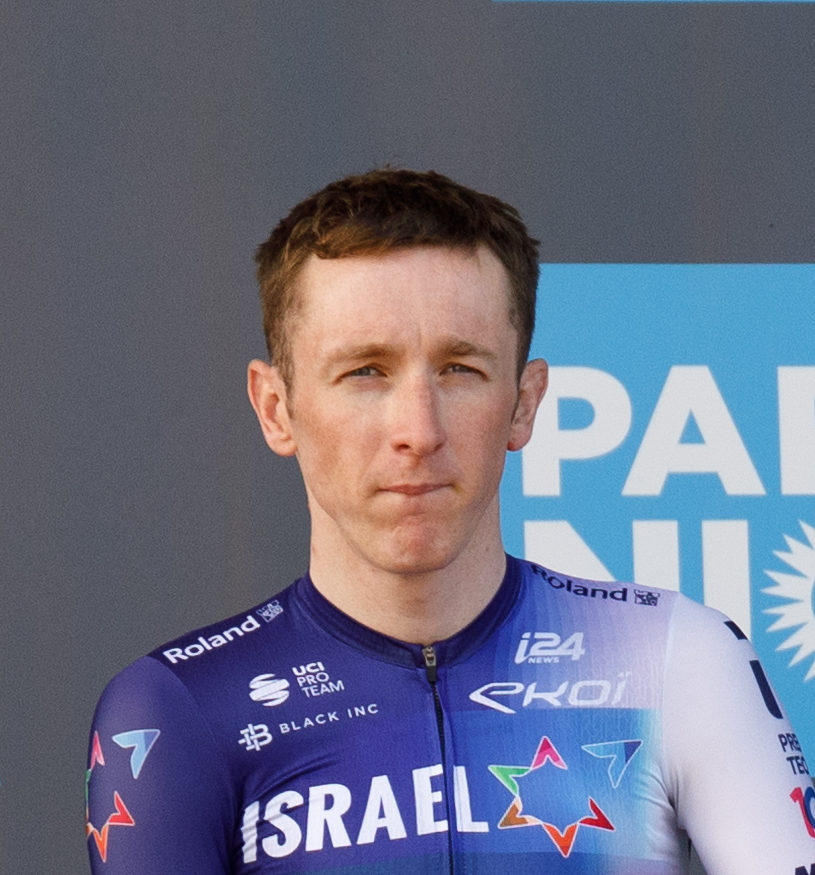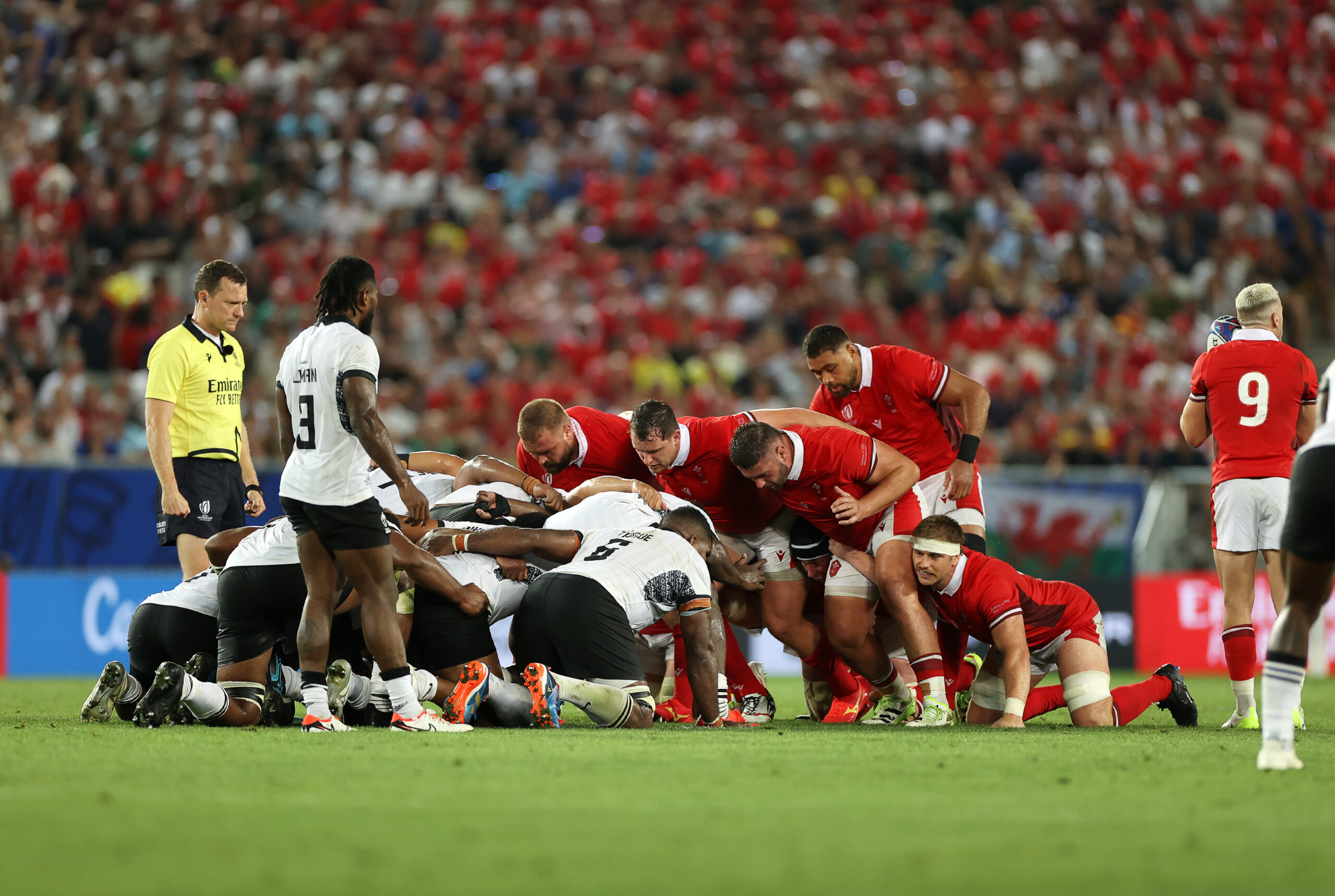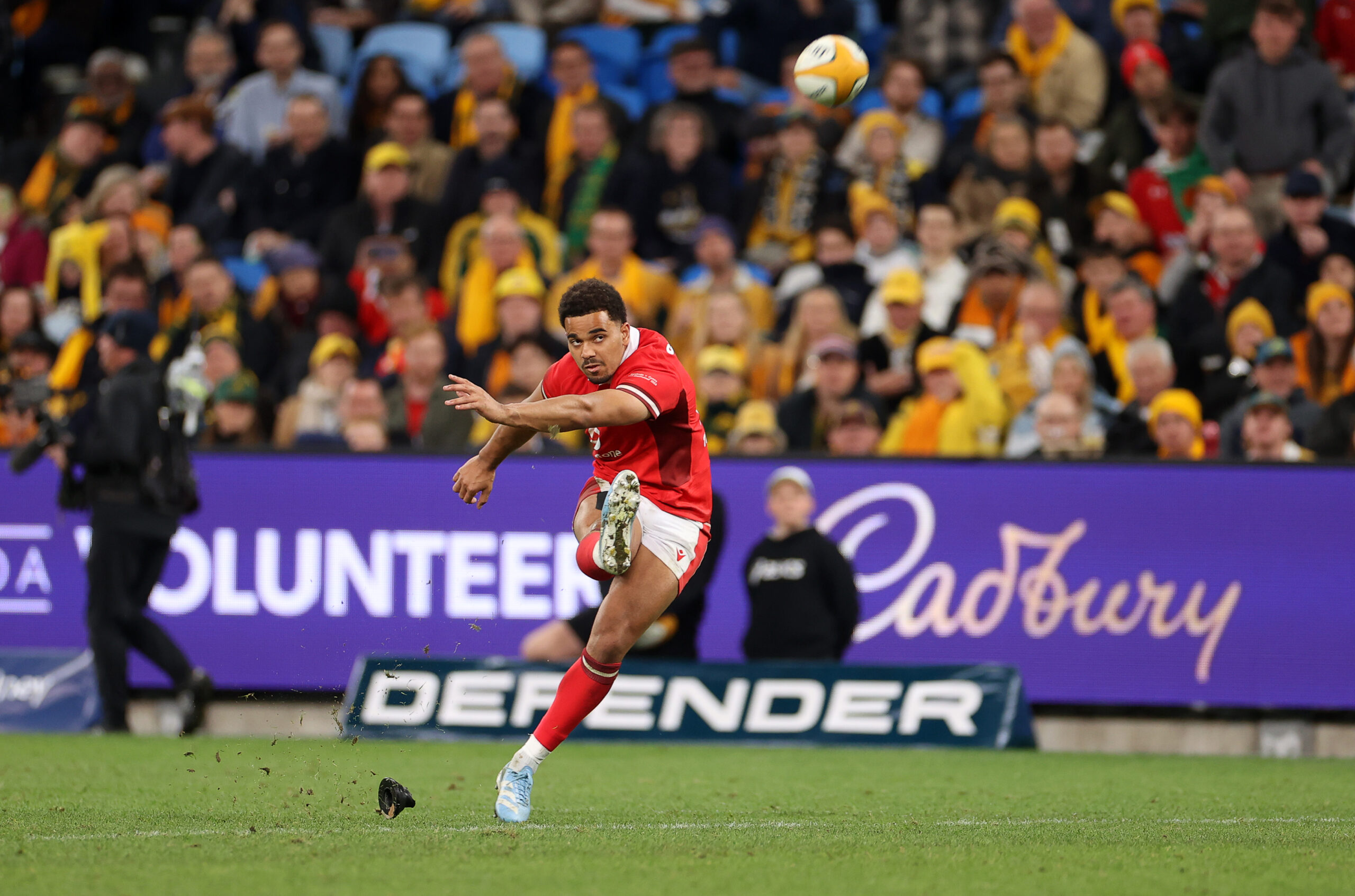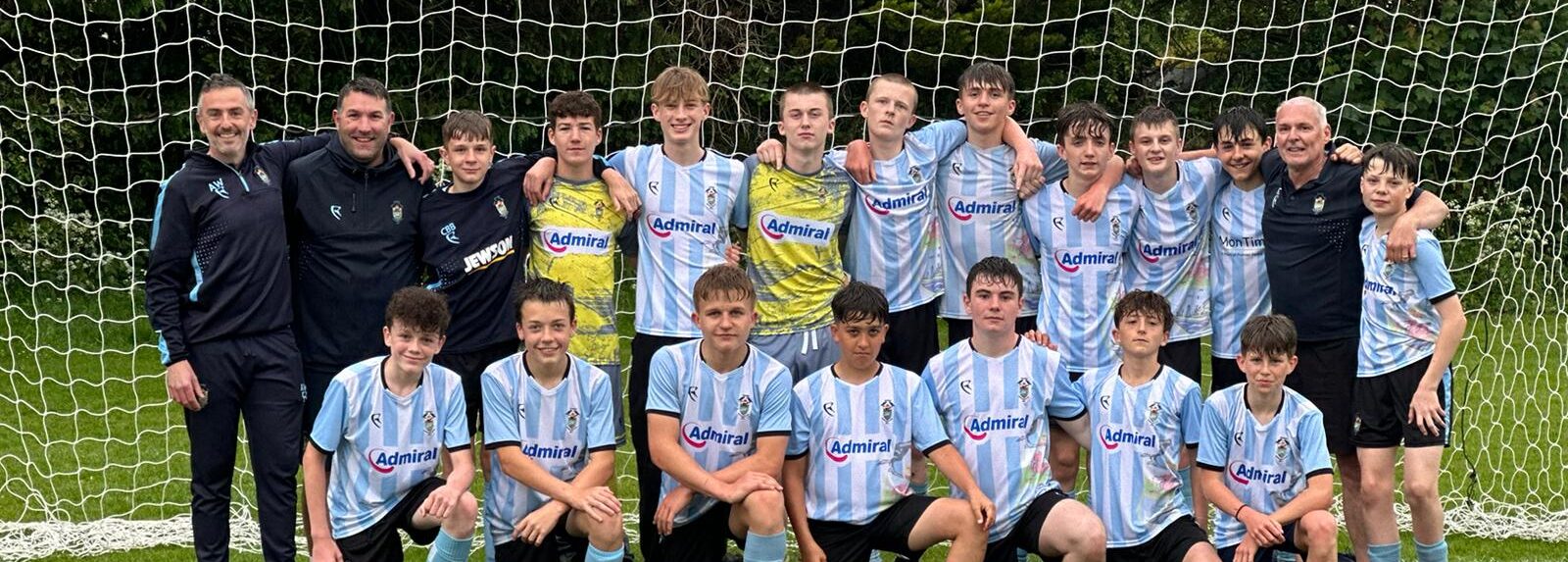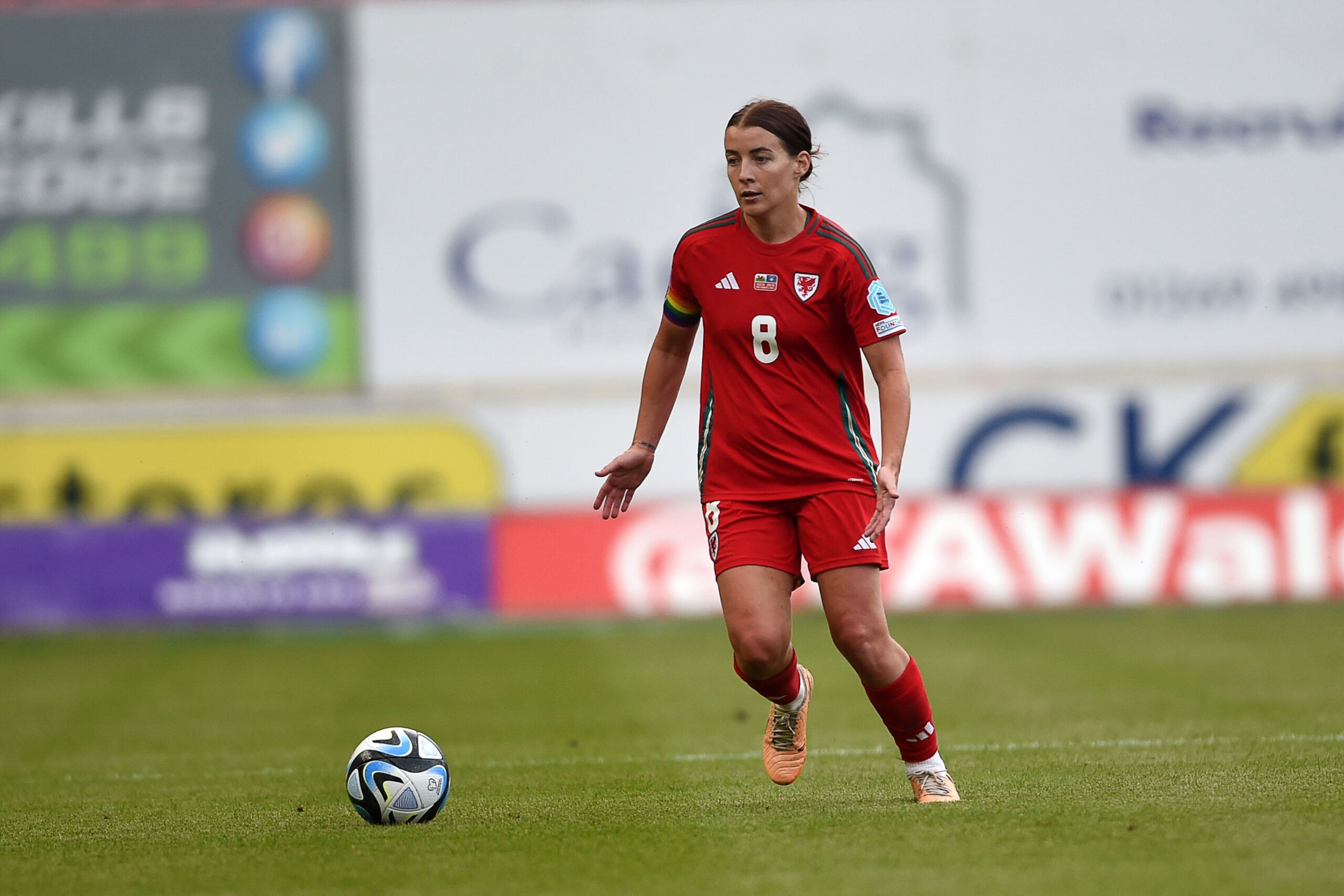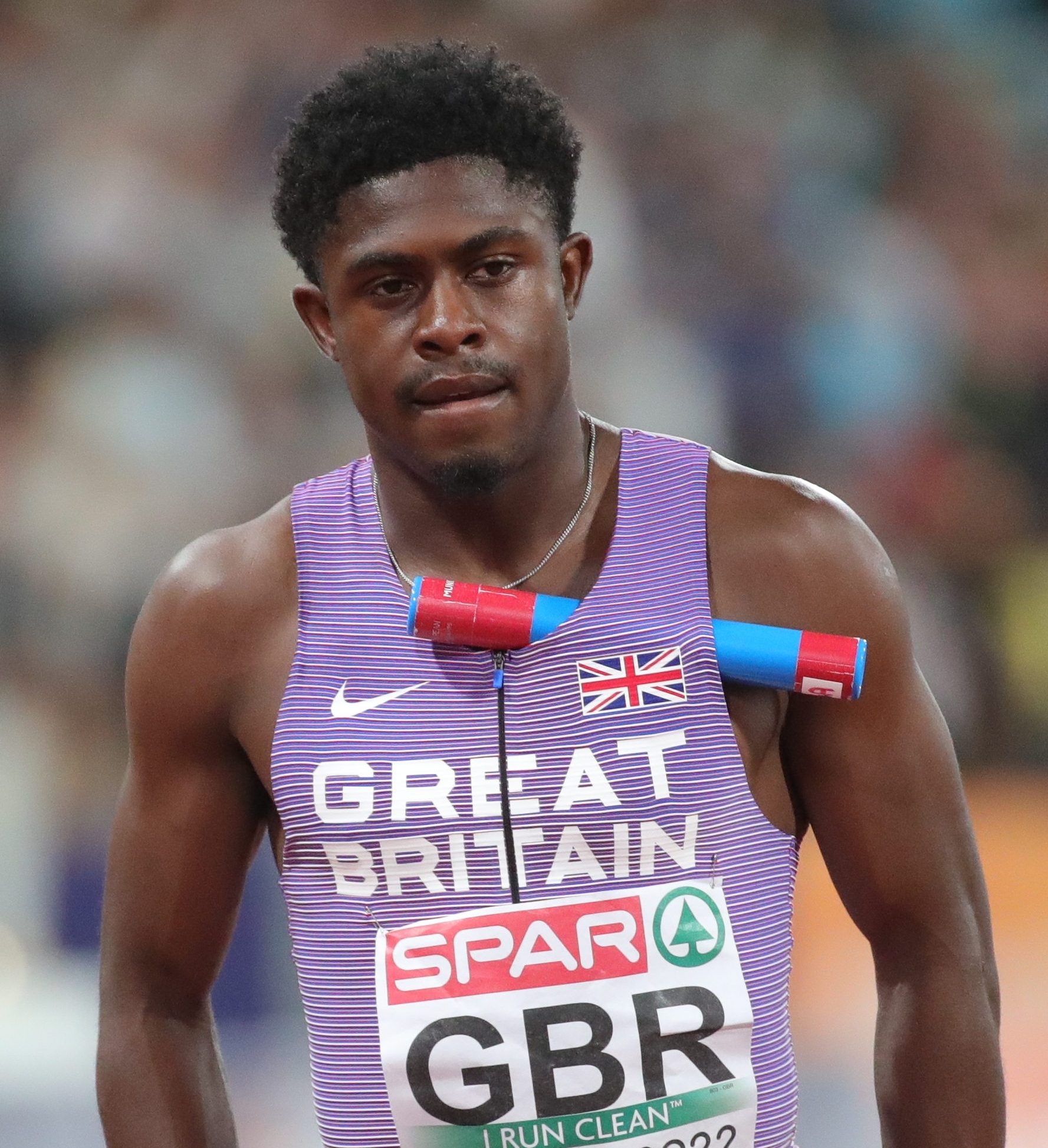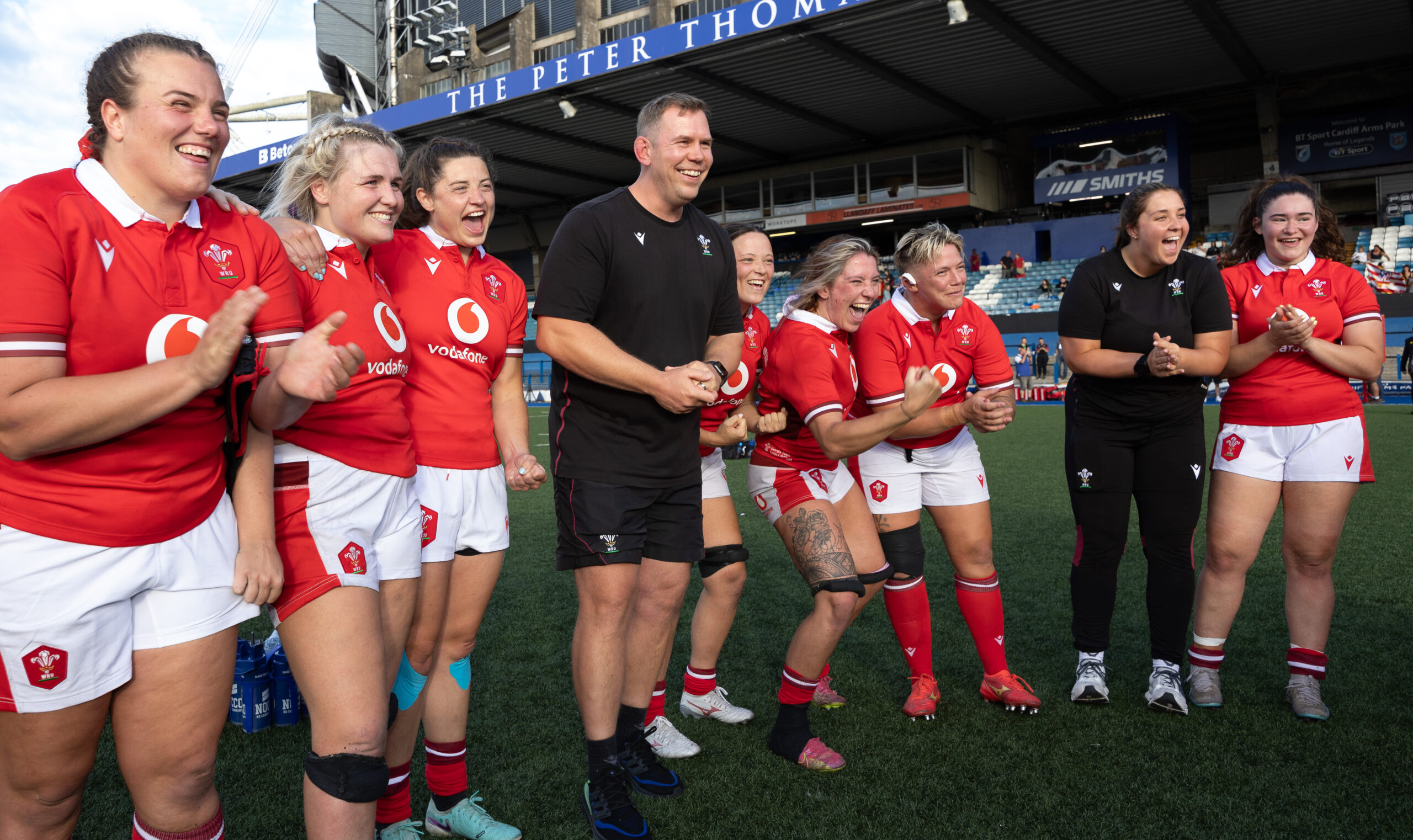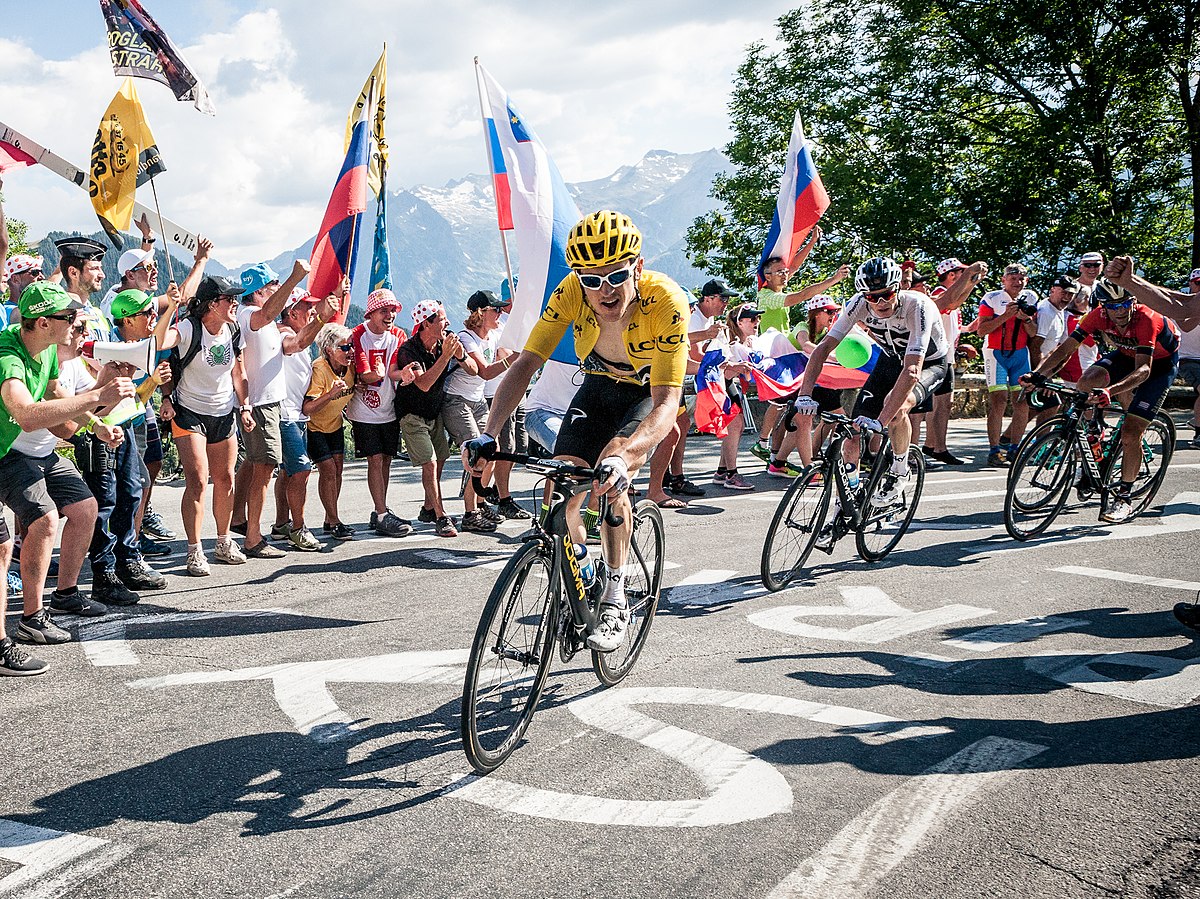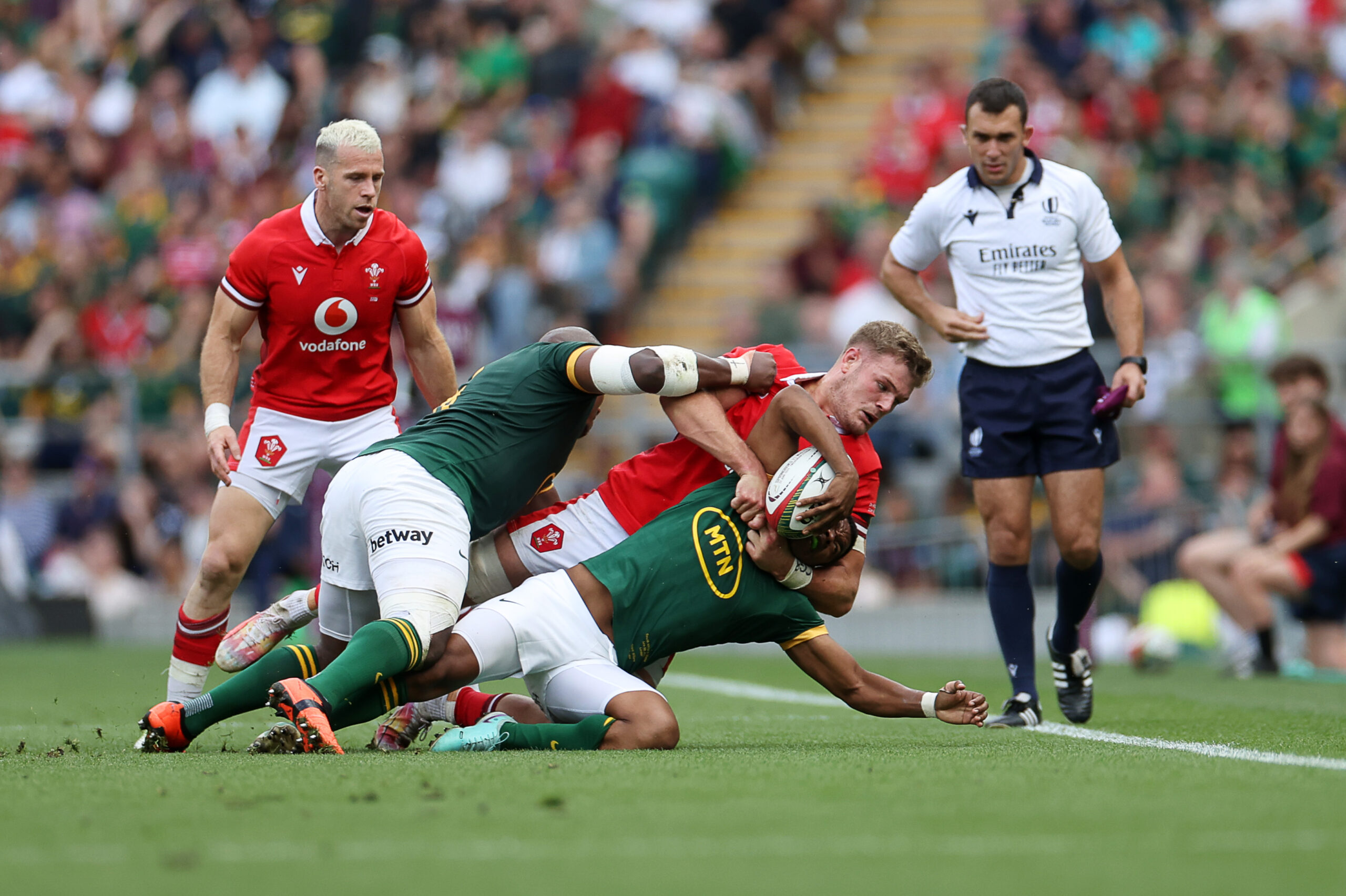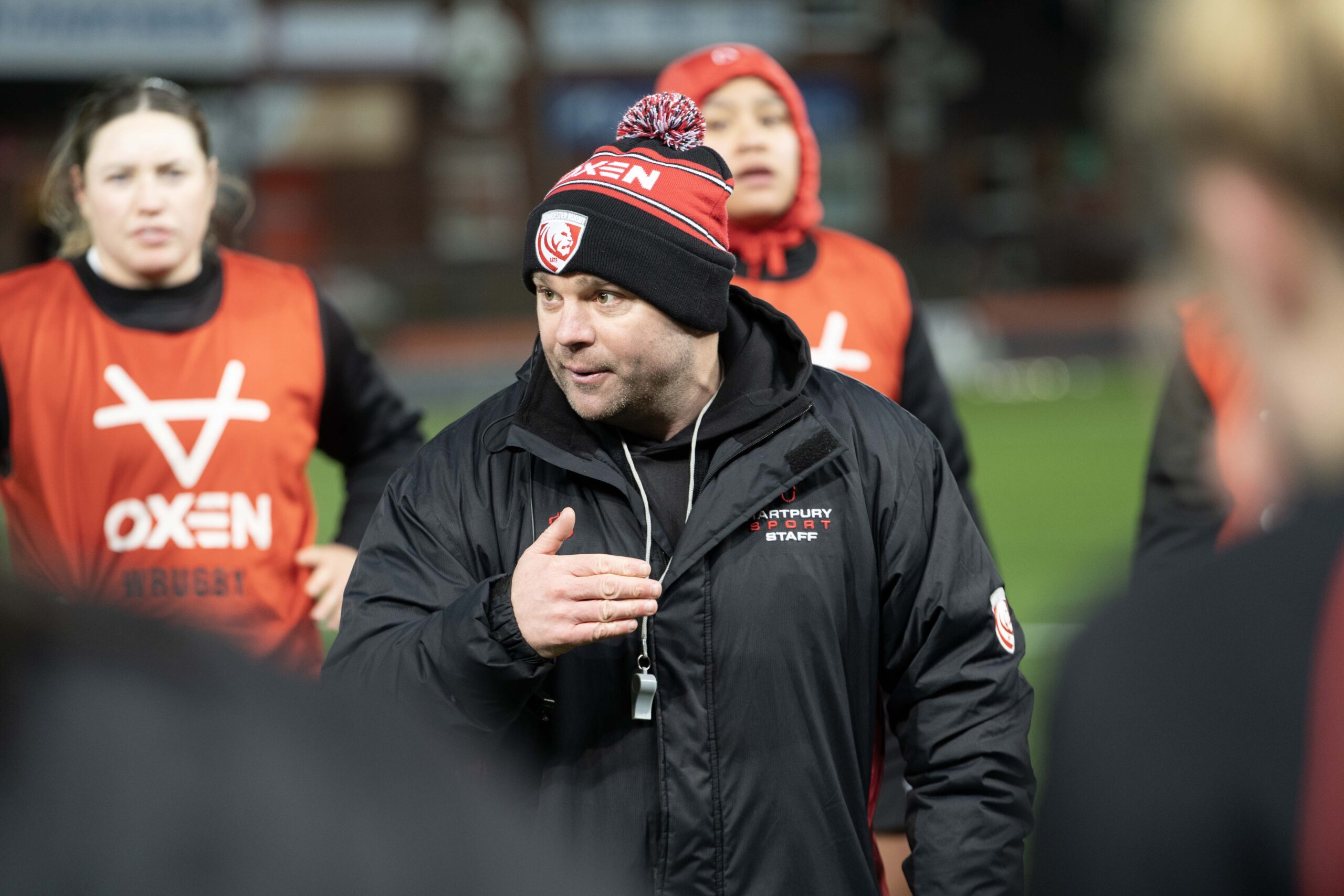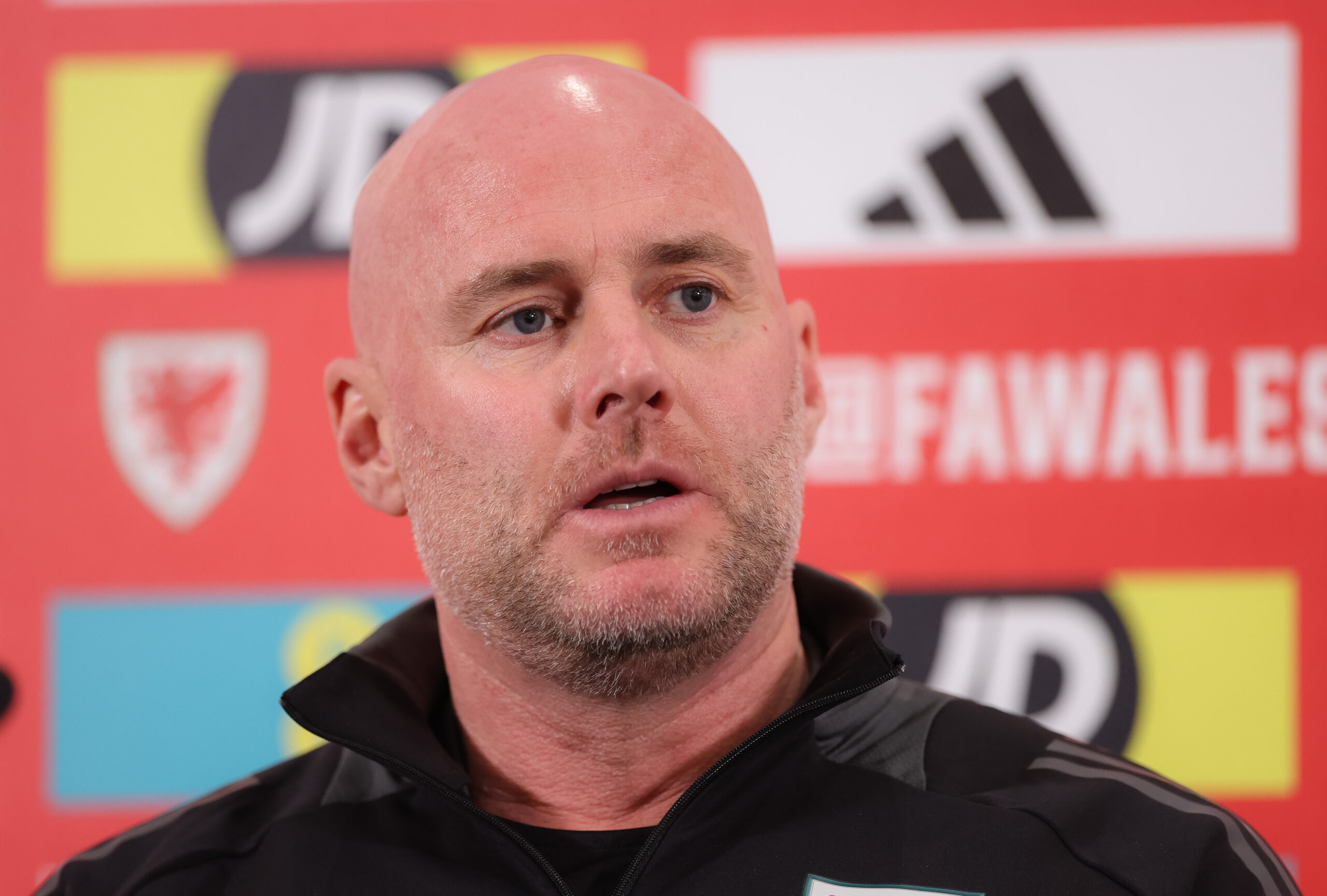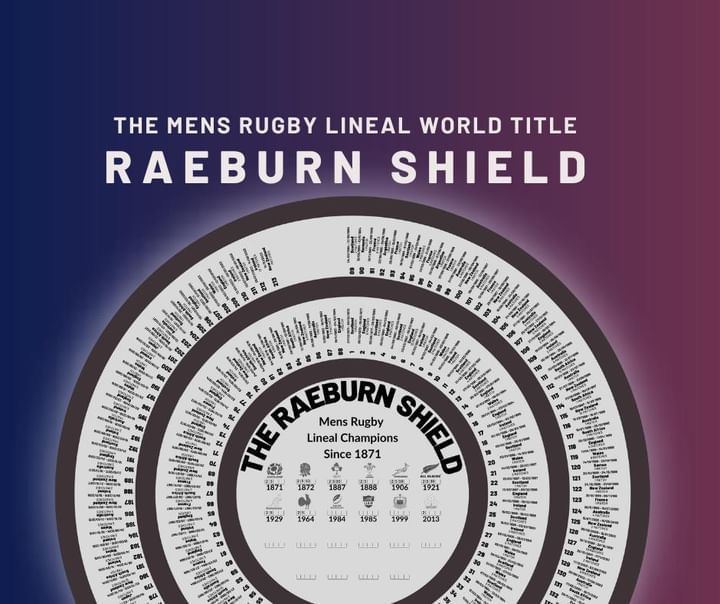Thomas And Williams Change Tack
Carwyn Harris
It’s been an incredible start to this year’s Tour de France.
It all began on Saturday with a fairy tale win for French cyclist Romain Bardet in his final Tour de France grabbing the maillot jaune for the first time.
His one-two with DSM-Firmenich-PostNL team-mate Franck van den Broek was the stuff of dreams but for Astana and particularly their team leader Sir Mark Cavendish, stage one was the stuff of nightmares.
Cavendish endured a torrid stage, blowing up early in the heat and dropped on the first climb, facing a difficult chase to make the time limit.
The Manx man’s experience came to the fore as he came in 39 minutes down on Bardet but crucially, 10 minutes inside of the time limit.
After stage one ended in success from a long range attack it would have been easy to assume that stage two would be decided from the peloton, however the break won out as Arkea-B&B Hotels rider Kevin Vaquelin took his first Grand Tour stage win.
Behind was where things were interesting with Tadej Pogacar attacking over the final climb and joined by his big rival and reigning Tour de France champion Jonas Vingegaard, with the two going clear.
Eventually they were caught by Remco Evenepoel, the world time-trial champion powering his way to Vingegaard’s back wheel in the closing stages, towing along EF Education-Easy Post’s Richard Carapaz.
The result saw Pogacar overcome his deficit of 15 seconds to Bardet to take the yellow jersey with himself, Evenepoel, Vingegaard and Carapaz now six seconds ahead of the Frenchman in the general classification.
Welsh Hopes Wilt In The Heat
Amidst all the chaos Welsh duo Geraint Thomas and Stevie Williams have struggled.
Williams lost significant time on stage one, finishing almost half an hour behind stage winner Bardet.
Speaking to S4C after the stage, Williams said: “It was a difficult day, a disappointing day.”
“The weather was horrible today and I didn’t cope well with it.
“My legs closed on the big climbs. Legs were empty and even in the first few kilometres I knew the heat would get the better of me.
“It was a horrible day.”
Williams is known for excelling in wet weather conditions, as seen at this year’s La Flèche Wallonne winning in a rain-affected race.
Stage two was a much better day for Williams and even he was surprised by his form after his struggles on day one.
“It was a good surprise for me,” said Williams.
“I felt I came back from yesterday. It was a good stage for the team with Hugo Houle in the breakaway and I tested the legs after yesterday.
“I’m happy to say I’m back to the normal level after a disappointing stage yesterday.
“Fortunately for me, I’m here to race for stages not the general classification but today gives me confidence going into the next few stages.
“The level here is really strong and it’s nice to get the weekend out of the way an look forward to next week.”
Thomas on the other hand finished within the main group on stage one, five seconds behind Bardet but lost significant time on day two finishing nearly seven minutes down on the winner and nearly four and a half minutes behind the general classification favourites.
The 2018 Tour de France champion finished third at the Giro d’Italia earlier in the year and came into the race in a supporting role for Carlos Rodriguez.
What’s Next For Welsh Pair?
Now both Thomas and Williams will be there to support their teammates in their General Classification or stage hunting ambitions whilst also looking to win a stage for themselves.
Both are strong climbers with Williams in particular possessing a strong kick while Thomas will be competitive in the time-trials.
Monday’s stage is pan flat and neither will be considered favourites but where can they possibly hope for a stage win?
Stage four on Tuesday is the first true mountain stage of the tour, but one would expect that to be a battle royale between Pogacar and Vingegaard and what follows after that are three flat stages either side of an individual time-trial.
Stage nine sees 14 gravel stages, however even that might seem unlikely for a stage win for either Welsh rider meaning they may have to wait for week two and the mountains of stage 11.
If the breakaway can stay away, it looks like a good pick for Williams to target with a third category climb not long before the finish giving the opportunity for a punchy attack.
Thomas may look towards the mountain top finishes of stage 14 and 15, although much will depend on the intentions of Pogacar and Vingegaard with the former having already won 11 stages at the tour and took six stage wins at the Giro d’Italia.
Whatever happens, it may be a case of patience for the Welsh duo to succeed as Thomas searches for stage win number four and Williams his first on debut.
Azu And Jones Secure Olympic Spots
Carwyn Harris
Cardiff sprinter Jeremiah Azu has secured his place at this summer’s Paris Olympics with a silver medal at the UK Athletics Championships.
The European 100m individual Bronze medallist from 2022 in Munich clocked 10.25s in poor conditions to secure his place alongside Louie Hinchliffe on the train to Paris.
Azu and Hinchliffe were two of three British sprinters who had run the 100 metres in 10 seconds or less this year alongside Reece Prescod who finished eighth in the final on Saturday.
“When you start the sport it’s what you dream of,” said Azu in an interview with BBC Sport Wales.
“Getting to the big stage fighting for the medals I’m super happy.
“I’ve had the dream for five or six years now. Since I started athletics, I always wanted to be an Olympic medallist so to make my first Olympics is a dream come true.”
The third competitor in the individual 100m for Great Britain will be Zharnel Hughes with the world bronze medallist from Budapest in 2023 given a medical exemption from the national trials as he recovers from a hamstring injury.
Hughes might double up with the 200m having won European gold in that event two years ago.
All three will also hope to compete for a medal as part of the men’s 4x100m relay.
Three years ago at Tokyo, Hughes, Richard Kilty, Nethaneel Mitchell-Blake and CJ Ujah were part of the team which finished second in the final, only to have their silver medal stripped following a positive drugs test by Ujah at the games.
“I hope we can come back with some medals,” said Azu.
“Relay we always have a good shout and put a team together. I’d also like to make the final in the individual.
“Once you make the final, the odds are in your favour, it can go any way and that’s the focus for me.”
Elsewhere at the trials there was further Welsh success as Patrick Swan won a silver medal in the shot put with a throw of 17.83m and Freya Jones matched the feat with a 51.97m throw in the women’s javelin.
In the paralympic events Harrison Walsh won para discus gold with a throw of 54.82m.
Performance of the weekend from a Welsh perspective however goes to 17-year-old Gracie Griffiths who won gold in the 5-kilometre walk.
Unsurprisingly it was the Pembrokeshire athletes first British title in a time of 23:53.93.
Speaking after the race Griffiths said: “I think my time wasn’t the best, but I have come away as British Champion.”
“I am over the moon and I don’t think I could have given any more today, so I am happy with that.
“I was feeling a lot stronger as the race went on. I am happy about that because I have struggled in the past so finishing strong is a real positive for me.
“Since the end of last season, I wanted to come here and win the gold medal and challenge myself.”
Melissa Courtney-Bryant just missed out on a place to Paris in the women’s 1500m as she finished fourth behind a strong field including Tokyo silver medallist Laura Muir and race winner Georgia Bell.
Adele Nicholl also finished fourth in the women’s shot-put final while James Tomlinson missed out on a bronze medal by one centimetre to Nick Wedderman in the Discus final.
Meanwhile outside of athletics, there was good news for Jade Jones as the taekwondo gold medallist from London and Rio was announced as part of GB’s team for the Olympics.
Jones is set to equal Sarah Stevenson’s record by competing in her fourth Olympic games.
Jones said: “This will be my fourth Olympic Games, fifth including the Youth Olympics.”
“This one feels extra special, almost like the very first again when I was 19!
“People don’t understand how hard it is to even quality for an Olympics, so I am super proud and can’t wait to fight my heart out for GB and myself once again.”
Wales Beat Spain But What Did We Learn?
Carwyn Harris

Carwyn Harris
Wales’ game against Spain on Saturday was quite binary in nature.
Win and qualify for WXV2 and secure a place at the 2025 World Cup.
Lose and end up in WXV3 and pile further pressure on head coach Ioan Cunningham after a Six Nations wooden spoon.
Despite that, in many ways before the game some fans portrayed the game as lose-lose.
Even if Wales produced a convincing win the general response would have been ‘they should beat Spain anyway’.
Wales are ranked eighth in the world and should, all things being equal, beat a Spanish side who are ranked 13th and do not have their experience and professionalism.
After a blistering start with the home side running into a 14-0 lead, a shock looked on the cards as Spain took advantage of a yellow card to Wales win Carys Cox scoring 15 points in 10 minutes.
Both sides then traded tries before half time with Keira Bevan’s pinpoint goalkicking meaning Wales led 21-20 at the break.
From then on it was one-way traffic, Wales eventually running out winners, scoring 31 unanswered points for a 52-20 win.
Sportin Wales take a look back on the positives and workon’s from a crucial win for Ioan Cunningham and team.
The Scrum
The Welsh front row trio of Gwenllian Pyrs, Carys Phillips and Sisilia Tuipulotu were in full force on Saturday, pushing the Spanish front row backwards at will.
On three or more occasions Wales pushed Spain off their ball, winning possession against the head and that eventually led to the home side’s early tries.
With Georgia Evans and Abbie Fleming in the boiler room too, Wales enjoyed complete dominance in the scrum, something which was almost a throw back to Six Nations gone by.
The challenge now for Wales is to maintain that level of dominance against other professional and dare I say it more organised top-level opposition in the future.
Back Three
There was a time in Wales’ recent past where commentators and pundits criticised Wales for relying too much on a moment of brilliance from Jasmine Joyce-Butchers.
The GB sevens star was missing on Saturday as she prepares for the Paris Olympics and in the Six Nations was slightly off her dazzling best, but Wales now have strength in depth to compete with her for a back three berth.
Against Spain, Wales lined up with Carys Cox on the left wing, Lisa Neumann on the right and Jenny Hesketh at full back.
They also can call upon Bristol Bears’ Courtney Keight, Joyce’s sevens teammate Kayleigh Powell and Catherine Richards who shone for Gwalia Lightning in the Celtic Challenge. That is before you mention Carys Williams-Morris and Gwalia Lightning’s player of the season from the Cardiff region Rhodd Parry.
However, all of those will find it to displace the Welsh trio who played against Spain with Cox scoring a hattrick and Hesketh producing her most assured display to date in the red of Wales.
Hesketh made her debut during the Six Nations and at times the former England under 20’s captain appeared to struggle with the jump up to senior international rugby.
Against Spain, Hesketh set up Cox’s second try, before exchanging passes with the winger and showing good speed to score in the corner.
The Bristol Bears fullback still has work to do on her one-on-one tackling, but Cunningham and Wales will hope she continues her form into the Autumn.
Wales’ back row
It’s hard to claim this as something we learnt, merely a reaffirmation of what we already knew but Wales’ backrow is arguably their strongest position.
The triumvirate of Alisha Butchers, Alex Callender and Bethan Lewis all shone against Spain. Callender set Wales on their way in the first half with a superb angle for her try before producing a couple of crucial turnovers when Wales were under pressure in the first half in a performance befitting of her position as vice-captain.
Butchers won player of the match and scored a brace in a performance close to her very best having been a touch under her normally stratospheric standards during the Six Nations as she returned to international action after an ACL injury.
Lewis may not be the biggest, but she was seen shrugging off would-be tacklers from eight and produced her normally industrious display.
With Georgia Evans in the second row instead of her preferred back row slot, this is inarguably Wales’ strongest back row trio with the potential of 19-year-old Gwennan Hopkins off the bench.
Gaining and Utilising Experience
Kerin Lake won her 50th cap on Saturday and her experience was invaluable for Wales against Spain.
Someone who rarely makes a mistake, Lake carried with purpose and was unfortunate not to bag a try of her own, whilst giving her side crucial gainline.
Her experience, along with Hannah Jones outside of her will be of huge help to Lleucu George at flyhalf who is still learning the ropes of becoming an international 10 but is becoming more and more assured as her experience increases.
When in possession, George has all the tricks in her locker to become a world class 10 and needs only to learn which option to use when for international rugby.
The Areas To Improve
As stated, it was far from a perfect performance from Wales on Saturday and there are areas they must improve.
They lacked game management during the 10-minute spell while Cox was in the sinbin, conceding 15 points during that time and despite scoring soon afterwards, they didn’t close the half out, conceding with barely a minute remaining in the half.
Wales and Cunningham should be commended for how they righted the mistakes of the first half in the second producing an almost error free display.
The driving maul was a huge weapon for Wales on Saturday, however the lineout was a little more inconsistent with a few non-straight throws and Cunningham will hope his side can tidy that area up to utilise their threats.
Here’s hoping Wales continue to grow through WXV2 and come back to the Six Nations with a vengeance.
Wales' Tour de Force
Carwyn Harris
The biggest cycling race in the world sets off on Saturday as the Tour de France embarks from Florence on its 21-day mammoth ride.
This year the race begins in Italy and finishes in Nice rather than Paris due to the Olympic games.
The race sees most of cycling’s biggest stars including Tadej Pogačar, Jonas Vingegaard and Sir Mark Cavendish compete.
Pogačar and Vingegaard will be two of the favourites fighting for the overall win as both chase a third yellow jersey. Cavendish on the other hand is looking to be out on his own as the record holder of Tour de France stage wins as he searches for his 35th victory.
Two riders who will be looking to be in and amongst the stage winners are Welsh pair Geraint Thomas and Stevie Williams.
38-year-old Thomas returns to the race where he has won three individual stages and finished on the podium three times.
Thomas won the race in 2018 but this year is set to play more of a supporting role with Spain’s Carlos Rodriguez set to lead the team.
Their team, the Ineos Grenadiers, have four possible leaders including Rodriguez and Thomas with Tom Pidcock and Egan Bernal both capable of competing for the overall classification.
Bernal won the race in 2019 with Thomas right behind him in second, but then struggled with a back injury before suffering a life-threatening crash into the back of a stationary bus in 2022.
Rodriguez finished fifth in last year’s edition of the race taking a memorable win on stage 14 but will be hard pressed to get onto the podium this time round.
All of those who finished ahead of Rodriguez are at the race this year with Vingegaard, Pogačar and the Yates twins whilst World Time Trial Champion and former Vuelta a España winner Remco Evenepoel and four-time grand tour winner Primož Roglič are also in the mix.
Of course, anything can happen at Le Tour and Ineos will be hoping their strength in numbers at the front of the general classification can give them an advantage.
“I’m super excited,” said Thomas.
“We’ve got a strong team. We sat down on the bus briefly on what we want to get from the race and it all aligns.
“It’s still a challenge but there are a lot of guys capable of winning stages in the team. As long as we’re all pulling in the same direction which we will be.”
Whilst Thomas and Pidcock have both stated they are not going to intentionally lose time early in the race, both are looking for stage victories at the tour.
“I’ll get the opportunity to go for a stage but that can benefit the guys riding for general classification,” said Thomas.
“There’re other teams who have more of a weight to take of the race and bigger favourites so we can race differently.
“We’re not going to ride like Sky used to with one train on the front.”
This could well be Thomas’ final Tour de France. Although he has another year on his contract with Ineos in 2025 he may look to turn his focus to other races next year.
“It could be my last tour for sure,” said Thomas.
“I missed the race last year, it’s the biggest bike race in the world and to be here with these guys, looking to be aggressive, win some stages and be competitive in the GC is what I dreamt of as a kid.
“In the back of my mind it could be my last one but I’m not thinking about it and I’m going to go and enjoy it.”
Pogačar’s UAE team are expected to push hard in the first few days and take advantage of what may well be an undercooked Vingegaard who is returning from a broken collarbone, fractured ribs and a punctured lung, earlier in the year.
That might mean the Slovenian looks to make the first couple of stages particularly hard as he searches for an early advantage, but there will be plenty of other’s looking to grab an early win.
One who is on the hunt for stage victories is Israel-Premier Tech’s Stevie Williams.
The rider from Aberystwyth is riding Le Tour for the first time.
Williams has had a brilliant start to 2024, winning the Tour Down Under before becoming the first Briton to win the one-day monument La Flèche Wallonne.
Having spent years suffering with a chronic knee injury before being left without a team after B&B Hotels folded in December 2022, Williams has enjoyed his new start at Israel-Premier Tech and is revelling at the opportunity.
A strong climber with a swift kick, Williams will be a good pick for a breakaway stage win and could even win stage one if he is part of a small group coming to the line.
Williams one La Flèche Wallonne in torrential conditions and is particularly effective in wet or damp weather.
The experienced Thomas who is racing his 13th Tour de France gave his own advice to Williams.
“I told Stevie to soak it in and enjoy it,” said Thomas.
“It’s easy to say that, the tour is 10-fold bigger to any other bike race but if you’re here you deserve to be here.
“You’re racing the guys you race against all-year-round so there’s no difference there it’s just the attention.
“Don’t get drawn into the soap opera because every day there’s a story and you’ve just got to laugh at that.”
What Did We Learn From Wales’ Loss To South Africa?
Carwyn Harris

Carwyn Harris
Few gave Wales much of a hope when they took on the Boks at Twickenham on Saturday.
Facing the back-to-back world champions is difficult at the best of times but with Wales missing more than 15 players through injury and unavailability it was always going to be a tough ask.
The Boks were missing a horde of players too, meaning that the first hour or so became a pretty stilted display.
However, at half-time, Wales were just a point behind and could have had the lead if Mason Grady’s offload to Ellis Bevan had gone to hand or had Sam Costelow succeeded with a third penalty.
There were bright points. Dewi Lake’s ball carrying, epitomised by his opportunistic try, was good to see whilst Liam Williams was brilliant in the air in particular.
The Positives
Why don’t we start with those positives then. Throughout the Six Nations Wales’ physicality was questioned so it was a welcome return to the burly figure of Wales’ captain against the Boks: Dewi Lake.
Yes, the Ospreys man still needs to work on his darts in the lineout but he is one of, if not the, best ball carrier for Wales.
With Elliott Dee injured and Ryan Elias rested, he has an opportunity to stamp his authority on Wales’ number two shirt.
Another who was a welcome return was Liam Williams. Playing outside of his favoured fullback position, Williams oozed class at points particularly in the aerial battle.
It was his interception which led to Bevan’s opportunity, whilst his catch and instantaneous chicken-wing offload to Cam Winnett almost led to another golden opportunity.
With Winnett seemingly assured of his place at fullback and Adams rested, Williams will be a crucial addition to the back three.
Taine Plumtree in the lineout was also impressive, causing trouble for the Boks at set piece. Having not played since Wales’ World Cup warm-up matches, his athleticism and height will be a great addition in a position still up for grabs.
Wales’ grit in the first half was good, managing to swing the momentum towards them after a difficult first 15 minutes, down to 13 at one point.
Wales Slow Starters…Again
Wales started slowly against South Africa, as they did in the first and last games of the Six Nations against Scotland and Italy where they were 13 and 11 points down after 20 minutes.
Against the Boks, the score line was 14-3 with Wales having to spend the best part of 10 minutes down to 13 men with Rio Dyer and Aaron Wainwright in the sin-bin.
Whilst Wales couldn’t cope with the South African’s pace and accuracy for the first try, they were dismantled by the Boks’ power for the second, with only Wainwright’s cynical concession of a penalty denying Marx a walk in from the driving maul.
Ultimately, Wales need to be praised for the way they battled back in the first half but they looked tired in the final 10 minutes, perhaps a consequence of the energy exerted in the first half.
Scrum On Skates
First and foremost, South Africa’s scrum is well-established as the best in the world. When you can call on the likes of Frans Malherbe and Bongi Mbonambi from the bench, you know it must be good.
However, their dominance was emphatic on Saturday.
It doesn’t help when Wales refuse to pick their best scrummaging prop, Nicky Smith, who won several penalties off Malherbe out in South Africa when Ospreys beat Stormers in April.
The scrum was already on roller skates before the changes but on the bench for Wales was Kemsley Mathias and Harri O’Connor with Mathias having conceded the most penalties in the URC this season.
O’Connor came on just before half-time for the limping Keiron Assiratti, and the scrum deficiencies were merely escalated during his time on the pitch.
Defensive Miscommunication
Wales’s defensive structure was caught time and time again narrow with players jumping in.
Liam Williams, Owen Watkin and Mason Grady were all guilty of coming in without managing to get man and ball.
That will of course improve over time. Grady has never played professionally at 12 whilst Williams has been in Japan, missing the Six Nations and hopefully that communication improves during their tour of Australia.
At times it was too easy, but even through the middle Wales were weak.
Edwill van der Merwe showed good footwork when he danced through past Wales’ forwards, but from a Welsh perspective it was too easy.
Kemsley Mathias and Harri O’Connor both appeared tired as they failed to bring the Lions winger down, before the flyer showed good gas to beat the cover and score under the posts.
Unimaginative Attack
In attack, Wales lacked imagination. Former Wales back rowers Gwyn Jones and Sioned Harries on S4C’s coverage often bemoaned Wales’ lack of imagination in attack.
The metronomic regularity with which we saw an individual runner on first phase, be it Aaron Wainwright or Mason Grady, running into midfield without the threat of a dummy runner was, at best, frustrating.
Even within the 22, Wales lacked imagination, simply going around the corner, with Damien de Allende the beneficiary with a crucial turnover on 62 minutes whilst the game was still in the balance.
For an experimental team, there were few innovative tactics or plays on show with Wales seemingly happy to kick long after being stopped on the gainline.
Ill-discipline
Wales’ two early cards were from desperation, however the parade of penalties that followed allowing South Africa to piggy-back their big pack up the pitch was frustrating.
Time after time, Wales were penalised for not rolling away, with Dewi Lake forced to watch on frustratingly on more than one occasion having pilfered the ball only to see one of his teammates punished.
In the end, Wales made it too easy for South Africa at times to gain territory and momentum and in the second half in particular they allowed the Boks to pull away.
Lack Of Depth
Frankly, most Welsh fans would have been aware of this prior to kick-off.
With Mason Grady making his first professional start at 12 in the first half and Jacob Beetham playing 10 off the bench for the first time in his fledgling career, it screamed of a side attempting to put square pegs in round holes.
Not that either performed badly, but both need more experience in those roles to flourish on the international stage.
The hope will be, when the likes of Dafydd Jenkins, Christ Tshiunza, Tommy Reffell, Dillon Lewis and Nick Tompkins return along with a couple of injuries, that Wales will be stronger in the final 20 minutes.
For the time being however, it doesn’t appear Wales have taken many learnings from the Six Nations and their first wooden spoon since 2003.
Five Key Battles As Wales Take On The Boks
Carwyn Harris
Going into Wales’ game against South Africa you’d be forgiven for thinking they were limping into it with a long list of players and unavailable players.
Wales are without Six Nations captain Dafydd Jenkins and Christ Tshiunza who are both at Exeter, whilst Dillon Lewis, Archie Griffin, Nick Tompkins and Tommy Reffell are also unavailable as they are based in England.
Additionally, Will Rowlands, Alex Mann, Ryan Elias and Josh Adams have been rested for this summer whilst Jac Morgan is now set to miss the summer tour with a hamstring injury, Elliott Dee is also out along with Henry Thomas and Keelan Giles, while Adam Beard, Teddy Williams, Taulupe Faletau, Tomos Williams, Theo Cabango and Joe Roberts are also long-term injuries.
Sam Parry also stepped away from the squads amid claims he felt ‘disrespected’ by Warren Gatland.
Finally, Sportin Wales co-founder Gareth Anscombe announced he wouldn’t be taking part in the summer tour as he looks to return to fitness ahead of his pending move to Gloucester.
The Boks themselves are without several frontline players, Wales qualified Cameron Hanekom is set to appear for the Bulls in the URC final, along with Marco van Staden and Kurt-Lee Arendse. Bulls teammate Willie le Roux is injured as are fellow back threes Cheslin Kolbe, Damien Willemse and Canan Moodie as are forwards Steven Kitshoff, Jean Kleyn and Lood de Jager.
Despite all the players unavailable there are still some huge battles in play on Saturday, Sportin Wales take a closer look.
Dewi Lake v Malcolm Marx
Lake returns from injury and is back as captain with Jenkins unavailable and Morgan injured. Marx has had his own injury problems, missing the majority of the World Cup with a knee injury.
Both are destructive ball carriers and brilliant ball in hand while Marx loves a turnover or two.
The two were pictured in an iconic photo when the two came face-to-face during Wales’ tour of South Africa in 2022.
The Ospreys hooker will be hoping he can nail his arrows in the lineout Dragons’ second row pairing Matthew Screech and Ben Carter taking on Eben Etzebeth and Franco Mostert. Speaking of which…
Matthew Screech v Eben Etzebeth
Even considering Wales’ injury list at second row, Screech’s selection at second row raised more than a few eyebrows.
The Dragons man earnt his first cap against Argentina in 2021 but the now 31-year-old hadn’t earnt a second before this weekend.
Wales head coach Warren Gatland has heaped praise on Screech saying that he is in good shape and hopes he will do a good job in the set-piece, believing he still has room to grow.
Up against him is South Africa’s talismanic centurion Etzebeth who has arguably been the best player in his position for the best part of a decade. A tough test.
Taine Plumtree v Pieter-Steph du Toit
Plumtree’s third cap sees him take on former World Player of the Year du Toit.
Unfortunate to miss out on World Cup selection due to injury against England, Plumtree will be hoping to stake a claim for Wales’ blindside flanker position, with Mann rested.
Plumtree’s athleticism and lineout abilities offer something different to Mann but du Toit has all of the above and is a stern test for the Scarlet.
Originally thought of as a second row, du Toit is a strong lineout operator, combining speed with his height to be a threat in defensive lineouts. Expect to see him with ball-in-hand in the wide channels too.
Sam Costelow v Jordan Hendrikse
Two young fly-halves go head-to-head at Twickenham. Gatland has shown faith in Costelow putting further weight behind his belief that the 23-year-old Scarlet is the man for the future at 10 for Wales.
Compared to Hendrikse, Costelow is the experienced head of the two with 12 caps while the Lions fly-half is on debut.
Hendrikse is on his way to Sharks, a consistent performer at 10 if not as flashy as Manie Libbok or as defensively solid as Handrè Pollard.
Mason Grady v Andre Esterhuizen
Grady’s first professional start at 12 sees him take on one of the world’s best.
Gatland will be hoping Grady can offer his side the go-forward they were lacking during the physicality, whilst using his offloading ability to good effect.
The Cardiff back won’t get the same amount of space he’s seen at Cardiff on the wing or at outside centre.
Esterhuizen is as big and physical a ball carrier as you’ll find and he’ll try to put the shackles on Grady in defence.
The question remains whether this will be Grady’s long-term position but he will certainly provide a contrasting option to the likes of Nick Tompkins and Ben Thomas.
Sean Lynn: Gloucester-Hartpury’s Ringmaster and Wales’ Man In Waiting
Carwyn Harris
The Women’s Six Nations was an eye-opener for Welsh rugby.
After two successive third place finishes in the tournament, this year Wales ended up with the wooden spoon despite a final game win over Italy.
For Gloucester-Hartpury head coach Sean Lynn, that result against the Azzurri was a “massive sigh of relief” after being “blown away” against Scotland whilst he says there was a question about the “alignment” during a thrashing out in Ireland.
Lynn, a Welshman himself, coaches several of Ioan Cunningham’s Wales squad at Gloucester-Hartpury with no less than 11 of the squad part of Gloucester-Hartpury whilst Gwennan Hopkins is also a student at Hartpury University.
At club level, Gloucester-Hartpury have flourished as the reigning Premiership Women’s Rugby champions, going unbeaten in their first 15 games of the league this season.
“Results are looking amazing, but it’s not been that easy really,” says Lynn.
“When we went into playing Bristol and Saracens, we had 15 internationals injured and we came out on the right side of it, but we managed to give the youngsters opportunities and now it’s for me to manage them now.”
The plethora of youngsters is partly down to Gloucester-Hartpury’s programme and connection with Hartpury University.
“A few years ago, myself and James Forrester the CEO got ourselves together and said, ‘How have we got one of the best pathways in the world and we don’t keep them?’” says Lynn.
“Everyone knows the training age of some of these girls is quite low compared to the men’s game, but we try and keep these girls at Hartpury college and university to go to Gloucester-Hartpury, so I know they’ve had five years of training in the gym and also their skill development from the coaching staff, so we’re increasing their training age.
“We had a chat about how we could make this work, getting players who stay on, the likes of Nel Metcalfe and Hopkins.
“Metcalfe is very coachable. I was shocked when she first came in that every little bit of detail, I was telling her she would put that right. She’s got a lot to work on her game, but she’s 18 you’d expect that, and the girl can finish.
“I’m very excited as she’s an exciting talent.
“With Gwennan, in the women’s game you can see with certain individuals some of them join rugby late, but Hopkins has been brought up in rugby and understands it,” Lynn adds.
“She always has a smile on her face but works so so hard, I think Wales have a real star with Gwennan, but she needs to be managed.”
Metcalfe and Hopkins are just two of Wales’ side to come through the programme while national captain Hannah Jones and fly-half Lleucu George are also part of the Gloucester-Hartpury team.
This year was George’s first as the undisputed owner of Wales’ fabled no.10 jersey, with the 24-year-old having served her apprenticeship behind Elinor Snowsill and Robyn Wilkins in the past.
George is nicknamed 50:22 due to her booming boot, something she showcased to full effect in the win over Italy.
“We tailor our game to the players we’ve got,” said Lynn.
“Lleucu George flourishes for us, we know what her strengths are, and we utilise them, we take a lot of pride in our set-piece, we’re anchored by that and our territorial game.
“I’m loving Lleucu’s territorial game, she’s unique in the women’s game, I’m very impressed with how things are going.
“She’s developing her game in the club game but in the international world this is her first real Six Nations campaign in charge of the no.10 jersey. She’s a great individual around it and I could see her flourishing massively and growing into the international game.
“The more and more I saw her in the Six Nations campaign I saw her flourish. Yes, she missed some kicks to touch from penalties which are the ones you should be making but she’s making these momentum changers, the 50:22’s, kicks to turn the fullbacks.”
George’s half back partner at club is England scrum-half Natasha ‘Mo’ Hunt who Lynn lauds as “the world’s best number nine.”
“One thing we’ve said at Gloucester-Hartpury is we want Lleucu to take more of a lead and that goes for off the pitch as well,” says Lynn.
“The work she’s doing with the analyst and starting to lead our meetings, that didn’t happen before and it’s something we’re looking to grow, and girls being used to Lleucu’s voice because usually it was just Mo.
“One thing I challenged Lleucu on was ‘Why are you kicking that if we’ve got space?’ and she said, ‘If they don’t talk to us, I’ll kick it.’ So it’s about the girls outside talking to her.
“She’s only going to get better, having Keira Bevan and Sian Jones inside her but also the likes of Hannah Jones, Kerin Lake and Hannah Bluck outside her who need to make sure they’re helping her out as well, it can’t all come through the fly-half.”
While Gloucester-Hartpury’s success is grounded in a set-piece anchored by the likes of Sisilia Tuipulotu and Kelsey Jones along with England international Maud Muir, they also have the nickname “the circus” due to their attacking backs play.
“We talk about how we have a license to inspire, and we make sure we talk to our coaches to say that if the girls see space and want to use it then great but if they make mistakes and lose it then we can’t be on their backs,” says Lynn.
“We’re named the circus, and we want to be the cirque du soleil of the rugby world. We’ve had several meetings about that circus piece and our identity, and we take lots of pride about what that looks like.
“We need to be good at set-piece and the university team won their final in no small part because of their set-piece and the scrum coach and lineout coach are very happy because I take so much pride in that but when it comes to the backs its, go out and thrill, get out there and enjoy it.
One of the draws to playing at Hartpury university is the expert coaching available by both past and present players, including the likes of Wales back rower Bethan Lewis.
“Some of these girls don’t want to know about me they want to be coached by Sam Monahan and Mo Hunt our transitional coach who works closely with our 18- and 20-year-olds,” says Lynn.
“They’ve got to go to university because the women’s game is totally different to the men’s game, an academy player in the men’s can be earning good money but in the women’s they can’t, the girls have to go with a dual career.
“At the moment, the only fulltime girls are the ones being paid by unions, some may take a hit if they can financially afford it with their career and there’s no one better than Mo to work with those individuals to ensure they’re studying hard and working hard on their game.
“Our physical gym programmes follow the Gloucester-Hartpury’s programme, so all the girls know that if they’re at university they know what they’re getting and that’s the big difference.
“I hope BUCS start talking to us because perhaps they didn’t realise the influence we’d have on the Celtic Challenge in Wales as well because I think BUCS is the next best thing to PWR, watching the Hartpury University v Loughborough final the standard was outstanding, so physical.”
Who Will Be Wales' Next Manager?
Carwyn Harris
Rob Page has been sacked as Wales coach.
The man who has been in charge of Wales for the best part of four years, managing Cymru through one EUROS and to a World Cup, has gone.
Now, the attention will now turn to who will succeed Page as Wales’ next head coach.
Page was Ryan Giggs’ number two when he was appointed, and Wales may opt to select an interim manager again with former Cardiff and Swansea player Alan Knill and former Sheffield United forward Jack Lester his assistant managers.
Former Wales captain Chris Gunter is also part of the backroom team.
However, it is a former coach with Wales who appears to be both the fans’ and the bookies’ favourite.
Osian Roberts – EVENS – Odds courtesy of DragonBet
Osian Roberts, who recently took interim charge of Italian side Como taking them to Serie A, is currently the bookies’ favourite with Dragon Bet pricing him at even money.
Roberts was assistant under Chris Coleman during Wales’ run to the semi-finals of EURO 2016, and fans have already expressed their hope he will return.
“Osian Roberts knows the pathway. Knows the players and arguably should have been the guy after Coleman,” said one fan.
“Hopefully they [FAW] will see some common sense and name Osian Roberts who has proven himself in various countries.”
Craig Bellamy – 3/1
Close behind Roberts is current Burnley acting head coach Craig Bellamy.
The former Cardiff and Liverpool man won 78 caps for his country and is currently in a bit of flux after head coach Vincent Kompany made the move to Bayern Munich.
He has been heavily linked with succeeding Kompany at Burnley and hoping to lead them back to the Premier League after relegation at the end of last season.
Chris Coleman – 16/1
The return of Chris Coleman to the Wales job would seem another obvious option for Wales.
Their former manager during Wales’ most successful EUROs campaign and came within touching distance of the World Cup.
However, since his time at Wales, Coleman endured a disastrous spell at Sunderland where they were relegated to League One and has since taken jobs in China and Greece.
In May this year, Coleman was announced as the new manager of Cypriot side AEL Limassol and it will be unlikely he will be changing jobs so quickly and returning to Wales.
Rob Edwards – 25/1
Edwards is at slightly longer odds at 25/1 but the former Wolves defender has impressed during his short managerial career to date.
After getting Luton promoted to the Premier League last year, he saw his side relegated at the end of the season, despite an impressive fight with the smallest resources and budget in the league.
Wales would have hoped they might be able to tempt Edwards away from Luton after his side were relegated and the former Wales international would perhaps offer an alternative perspective having not been part of the set up since the last of his Wales caps in the lead up to EURO 2004.
However, he signed a new four-year-deal at the Hatters on Wednesday meaning it will be incredibly unlikely he will move now to take the Wales job.
Others
Others are in the reckoning including the likes of former Stoke and Southampton boss Nathan Jones, 16/1, who was appointed Charlton boss in February 2024.
Mark Hughes, 25/1, who was Wales’ head coach between 1999 and 2004 is another option whilst ex-Stoke and West Brom boss Tony Pulis, 33/1, would offer a complete contrast in culture to what is currently in place.
All further odds are available on the DragonBet website.
The expectation is that Wales will look to someone who is Welsh to be appointed and have already missed out on Steve Cooper, who was appointed as Leicester City’s new boss on Thursday.
Non-Welsh managers could include a number of managers at the current EUROs, including Portugal coach Roberto Martinez or France’s Olympics head coach Thierry Henry.
Finally, ex-Swansea head coach Graham Potter is currently without a coaching position and missed out to Cooper for the Leicester job. The current line is that Potter is keen on the England job, with Gareth Southgate more than likely to step down after EURO 2024.
Whoever it is, will be taking charge as Wales face a tough start to their Nation’s League campaign as they host Turkey on September 6th.
Reaction As Rob Page Removed From Post In Summer Surprise
Carwyn Harris
Wales manager Rob Page has been sacked in a surprise move from the FAW.
The decision, whilst surprising, came after Wales’ dismal summer friendlies where they drew 0-0 with Gibraltar and lost 4-0 to Slovakia, having just missed out on EUROs qualification on penalties against Poland.
Fans had expressed their frustration at Page during the loss to Slovakia with boos and heckles coming from the away crowd.
On the Sportin Wales podcast last week, Wales striker Sam Vokes and talkSPORT’s Laurence Mora expressed their support for Page,
However, the FAW decided to remove him from post, despite declaring their support for him as recently as March after the play-off against Poland.
In a statement, Noel Mooney, CEO of the FAW said: “On behalf of myself and the entire FAW, I extend our heartfelt gratitude to Rob for his commitment and dedication to his roles for the National Teams.”
“Under Rob Page’s leadership, our Cymru men’s team has achieved significant milestones and victories which have created many incredible memories for our nation, most notably our first World Cup in sixty-four years.”
Page spent 23 months as an interim coach before getting the role permanently in September 2022 and in the eyes of some including Mora he has never received the credit he deserves for his successes with Wales.
On hearing the news, Vokes said: “Wow, I’m pretty shocked.”
“I Didn’t see that coming. Especially surprised with the timing after 2 summer friendlies and the backing in him after the play-offs.
“Although the FAW may be looking at giving someone new a fresh start going into the autumn Nations League fixtures.”
The fan reaction has seen the vast majority supporting the decision to remove Page from post.
One comment said that Page had “worked to the best of his abilities and got us to the EUROs and the World Cup, which he can be proud of. However, it is clear his abilities are not good enough for this group of players and it is time to move on.”
One of Page’s mantras in recent times has been to call Wales a ‘team in transition’ during the post Gareth Bale and Joe Allen era.
This mantra was heard after the loss to Slovakia with fans chanting it at Page.
After the news one fan said: “It’s about time, probably two or three years too late.”
“The stereotype of plucky little Wales went away years ago, a ‘team in transition’ shouldn’t be drawing with Gibraltar and getting stuffed by Slovakia.”
However, whilst the majority feel Page should have gone, others feel he has “paid the price Wales’ overachievement in recent years”.
One fan said: “Honourable man, Page, unlucky not to have the sprinkling of stardust that his predecessors enjoyed.”
Whilst another put: “Getting sacked over two meaningless friendlies, regardless of how miserable the results were – when senior players were out, seems counterintuitive.”
Despite the criticism from fans and pundits, Page was a player’s favourite epitomised by the under-pressure performance from Wales when they face Croatia in October last year.
Aaron Ramsey posted on X (twitter): “It has been a journey we can all be proud of from the euros to taking Wales to a World Cup for the first time since ‘58.”
“I personally just want to thank you for all you have done for me🙏🏼
“You have been a privilege to work with, a gentleman and true family man.
“Myself and the team will forever be grateful for your guidance. These past few years are years we will treasure.
“Thank you, Rambo.”
Expect more and more players to express their gratitude to Page over the coming hours and days.
Wales Take On 'Boks For Rugby's Oldest Trophy
Carwyn Harris
When an understrength Wales and South Africa face off on Saturday, in a game outside of rugby’s international window, you would be forgiven for thinking there’s very little on the line.
However, for some, that couldn’t be further for the truth.
Several players are fighting for their position whilst there is also the opportunity of silverware.
No, I’m not talking about the Prince William Cup, a trophy the two have competed for since 2007 – with Wales winning six and South Africa 12.
Rather, the Raeburn Shield.
Much like the wooden spoon in the Six Nations, the Raeburn Shield is not a physical trophy that Saturday’s winner can hold in their hands but rather a hypothetical linear trophy.
The idea for the shield began in fan forums online in 2008.
Dave Algie, one of those involved in the trophy’s conception, has since taken to social media, promoting the idea of a physical shield in the future.
Algie admits one of the reasons it was born was on the back of disappointment following his native New Zealand’s loss in the 2007 World Cup but the “historical beauty” of the trophy has made it a great study.
The idea is that the trophy is a title holders trophy, a winner stays on mentality, similar to that of boxing with the championship belts.
Therefore, the trophy dates back to the first ever game between England and Scotland in 1871, 116 years before the first Webb Ellis Cup tournament.
The name Raeburn is born from Raeburn Place where that first international was held, similarly the Utrecht Shield for women’s rugby is named after the first international between France and Netherlands.
The Raeburn Shield has been ‘won’ by 12 different nations.
New Zealand, South Africa, Australia, Argentina, England, Ireland, France, Wales and the first ever holders Scotland, along with tier two countries Japan, Romania and Samoa.
Unsurprisingly, New Zealand have held the trophy the most, successfully holding the trophy for three years between 1987 and 1990 with 17 successive defences, the most in the title’s history.
More recently, Ireland had 16 successive defences between their win in New Zealand in July 2022 and their World Cup quarter-final defeat to the same opposition 15 months later.
That left the All Blacks as the ‘holders’ only for them to lose 11-12 in the World Cup final against South Africa.
The Boks haven’t played since that win in Paris, meaning if Wales win on Saturday they will be the holders of the trophy for the 18th time in their history.
Wales first held the trophy in 1888 when a Thomas Pryce-Jenkins try gave them the win against Scotland during that years’ Home Nations Championship.
Bizarrely, Wales didn’t hold the trophy at all during their golden generation of the 70’s, with a huge hole between their 11-6 win against England in 1966 and their next trophy win against Scotland in 1986.
Wales’ famous 32-31 win against England saw them take the shield and go on their longest run in their history with the trophy, winning seven further games including a summer tour to Argentina and the first ever game at the Principality Stadium, against South Africa.
Ultimately, the run ended in dismay for Wales with a 31-38 defeat to Samoa at their home World Cup.
“Wales losing to Samoa was a bit depressing from a Welsh perspective, but it was lovely from a history perspective with Samoa winning the shield for the first time,” said Algie.
Wales last held the shield in 2022, beating Scotland 17-20 at the Principality Stadium, only to lose the shield one game and 14 days later in a 23-19 loss at Twickenham.
For Wales women, who have held the trophy twice, in 2015 and 2016 after wins against England and France respectively, reclaiming the Utrecht Shield may seem a long way off, however that might not be the case.
“That’s one of the great things about the shield is that whenever you think you’re going to get something, you don’t,” said Algie.
“You can’t pre-plan expecting the trophy and some countries don’t get to play for the trophy for a long time.
“For instance, Canada took the Utrecht shield from Australia in May and then faced the Black Ferns. Everything was set up for New Zealand to take the trophy and then take on England at Twickenham in June but then Canada beat the Black Ferns 22-19.”
Currently, there is not a physical shield and Algie is trying to raise funds to make his dream a reality.
“The Utrecht trophy is done and the design for the Raeburn Shield is too,” said Algie.
“We wanted English oak for the Raeburn and French oak for the Utrecht as a nod to their origins.
“I’m just having to be patient as it costs a lot of money. We are fundraising and people can donate to get their name on the back of the shield and be a part of history.”
Whilst the trophy is not recognised by World Rugby right now, Algie believes eventually that will come.
“My mission is that the trophy will be in the hands of the players and then fans are interacting with the idea of the shield, planning ahead for when and where they could win it.
“In the future, tournaments will want the Raeburn shield or Utrecht shield to be on the line. Imagine the holders’ captain walking out with it and placing it on the side of the pitch and then the captain handing it to the next winning captain.
“For broadcasters and media it would be pure theatre and add drama to every game. Look at this weekend, Wales could do it and become the holders. Anything can happen in a one-off game!”

